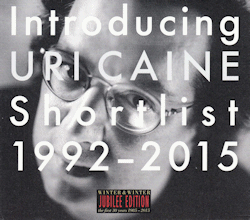-
The Goldberg Variations : Aria
-
The Goldberg Variations : Variation 1
-
The Goldberg Variations : Variation 5 (+ 8)
-
How Long Has This Been Going On
-
Otello : Drinking Song
-
This Is A Thing Called Love
-
The Goldberg Variations : The Contrapunto Variation
-
Blackbird
-
Strom's Theremin
-
Im Wunderschönen Monat Mai
-
Only Love Beauty
-
Yellow Stars In Heaven
-
Introduction To Symphony No. 5
-
Symphony No. 5, Adagietto
Uri Caine - Piano, keyboards
Achille Succi - Clarinet (track 5)
Greg Osby - Alto sax (track 7)
David Binney - Alto sax (track 14)
Ralph Alessi - Trumpet (tracks 5, 14)
Dave Douglas - Trumpet (track 12)
Vittorio Ghielmi - Viola da Gamba (track 2)
Joyce Hammann - Violin (track 5)
Mark Feldman - Violin (track 14)
Nguyęn Lę - Guitar (track 5)
David Gilmore - Guitar (track 10)
Tim Lefebvre - Boomish elec (track 3), bass (tracks 5, 9)
Kenny Davis - Bass (track 6)
James Genuss - Bass (track 7)
Dave Holland - Bass (track 12)
Michael Formanek - Bass (track 14)
Zach Danziger - Boomish elec (track 3), drums (tracks 5, 9)
Ralph Peterson - Drums (tracks 6, 7, 12)
Jim Black - Drums (track 14)
Milton Cardona - Percussion (track 7)
Arto Tunçboyaciyan - Percussion (track 9)
Don Alias - Percussion (track 12)
DJ Olive - Turntables, live elec (tracks 13, 14)
Marco Bermudez - Vocals, words (track 7)
Mark Ledford - Vocals (track 10)
Barbara Walker - Vocals (track 11)
Julie Patton - Poet (track 10)
Kettwiger Bach Ensemble, Wolfgang Klasener - conductor (track 11)
This fascinating CD of Uri Caine's work over a thirteen year period shows just how varied the oeuvre of the Philadelphia-born pianist has been. If
your taste in classical/jazz crossover, for instance, has previously run, say, to the Swingle Singers or Jacques Loussier, you'll find that Caine
offers something rather different. He is not afraid to experiment in terms of composition, material or instrumentation. He has taken well-known
works by classical greats such as Bach, Robert Schumann and Mahler and given them jazz arrangements. Most of the time, the results are
intoxicating, though occasionally they are less successful. Inevitably, with a selection which spans ten albums and thirteen years, there is a
degree of unevenness. Still, this is a fine collection which showcases not only the classical/jazz crossover element present in Caine's repertoire
since the mid to late 1990s but also his exceptional touch on jazz standards and the liveliness of his musical imagination.
The opening track, The Goldberg Variations: Aria, a familiar Bach melody, is played without embellishment by Caine and reminds us of what
a superb classical musician he is (he didn't begin his jazz career proper until he was in his twenties). The Aria leads immediately untoVariation 1, where he is joined by Vittorio Ghielmi on viola da gamba and another pitch perfect performance ensues. Otello: Drinking Song is Caine's rousing take on a piece by Verdi, here played with humour and élan. Caine is joined by violin, clarinet,
trumpet, guitar, bass and drums. The Goldberg Variations : The Contrapunto Variation is given an infectious Latin flavour, with Ralph
Alessi in fine form on trumpet and lively contributions from Milton Cardona and Ralph Peterson on percussion and drums respectively. Yet another
distinctive version of a classic is Symphony No. 5, Adagietto by Gustav Mahler which, while there is superlative playing of violin (Mark
Feldman) and trumpet (Ralph Alessi), verges on the eccentric at certain moments. DJ Olive, an American disc jockey and turntablist (sic) produces
electronic music and has appeared on six of Caine's albums between 1997 and 2006. He features on the last couple of tracks of this compilation. I
wish I could appreciate his role more - my resistance, of course, may simply be a generational thing.
Apart from Caine's exploration of classical material, not all of which I've mentioned here, his own compositions play their part in the success of
the CD. This Is A Thing Called Love is taken from an early album and is a bop-ish piece which occasionally references (surprise, surprise) What Is This Thing Called Love. The dynamic piano-led trio have drive and momentum in plenty. Strom's Theremin is an up-tempo
swinger, taken at full-tilt. Yellow Stars In Heaven, meanwhile, is a haunting refrain from 1995 with an all-star line-up. Dave Douglas, on
trumpet, is a model of lucidity while, as we might expect, Dave Holland gives an accomplished performance on bass. There is strong support, too,
from Ralph Peterson on drums and Don Alias on percussion.
Undoubtedly, one of the most potent recordings on the album is Gershwin's How Long Has This Been Going On. This evocative standard is
immaculately performed, with finesse and feeling by Caine, who is solo on piano. Close behind this for lyricism and grace is Lennon and McCartney's Blackbird. I once heard a spectacular version of this tune played live by Zoë Rahman but Caine even surpasses that. There is panache,
vigour and more than a hint of gospel from him, again on solo piano, on this track.
Uri Caine is known as someone who brings together, in his playing, composing and arranging, multiple different strands of our musical inheritance.
His fertile invention and creative genius enhance any project he touches. Listeners will find their appreciation of Caine heightened by this disc
as he shows us what can be achieved with an imaginative response to the challenge of combining diverse musical genres.
James Poore
